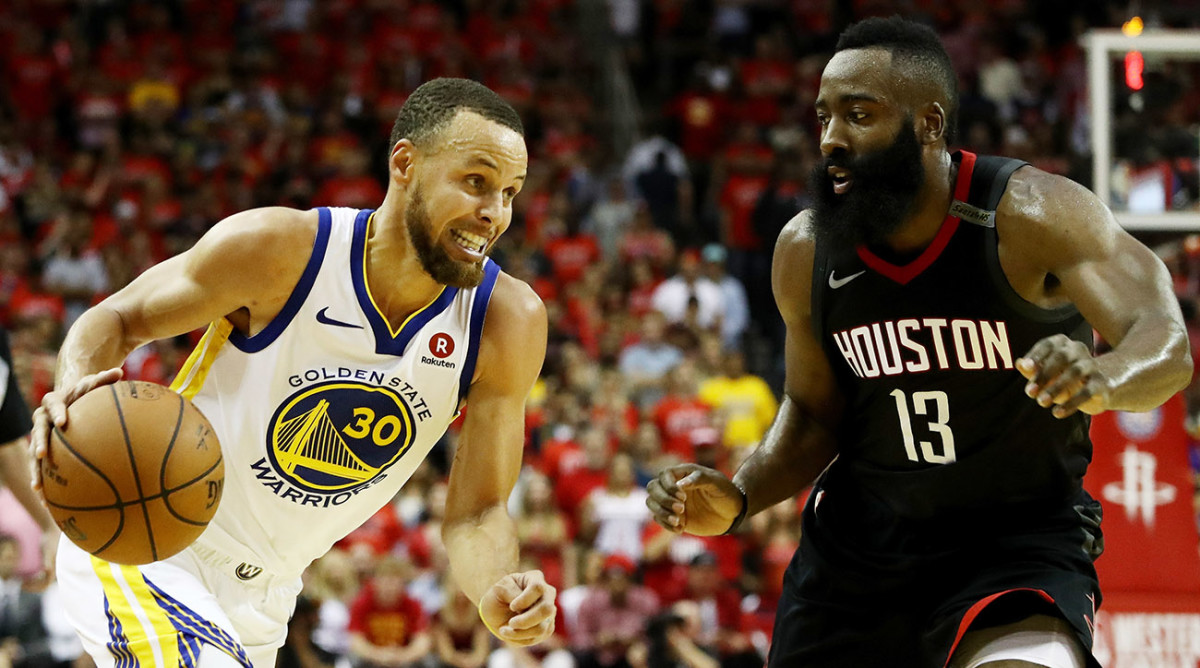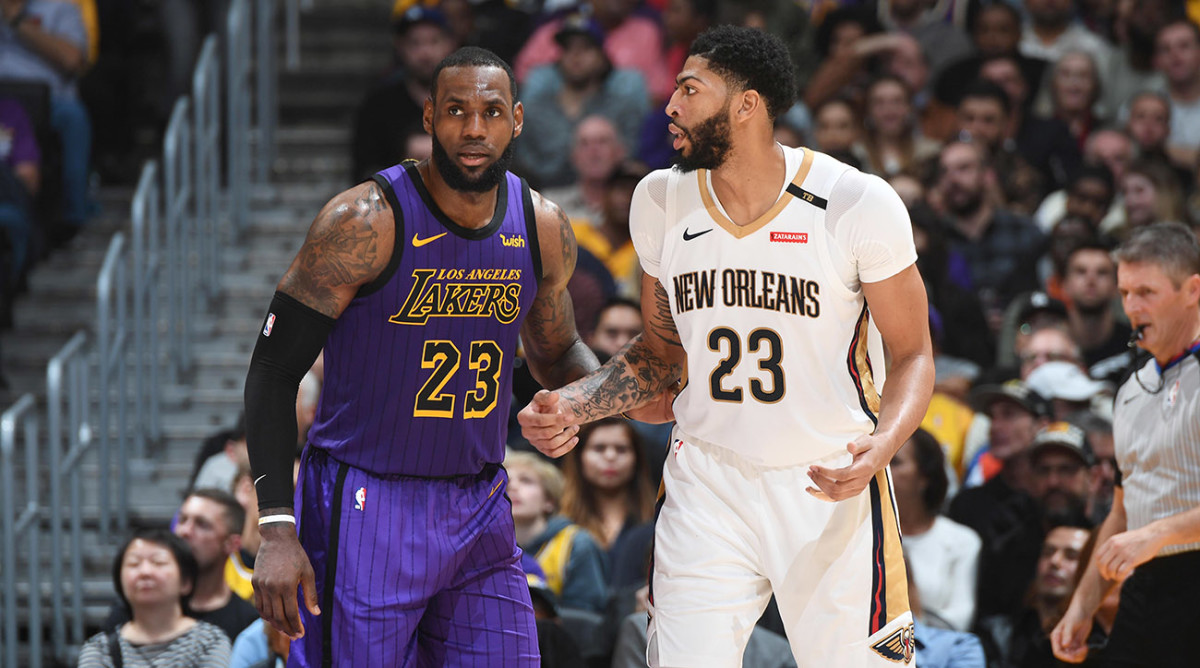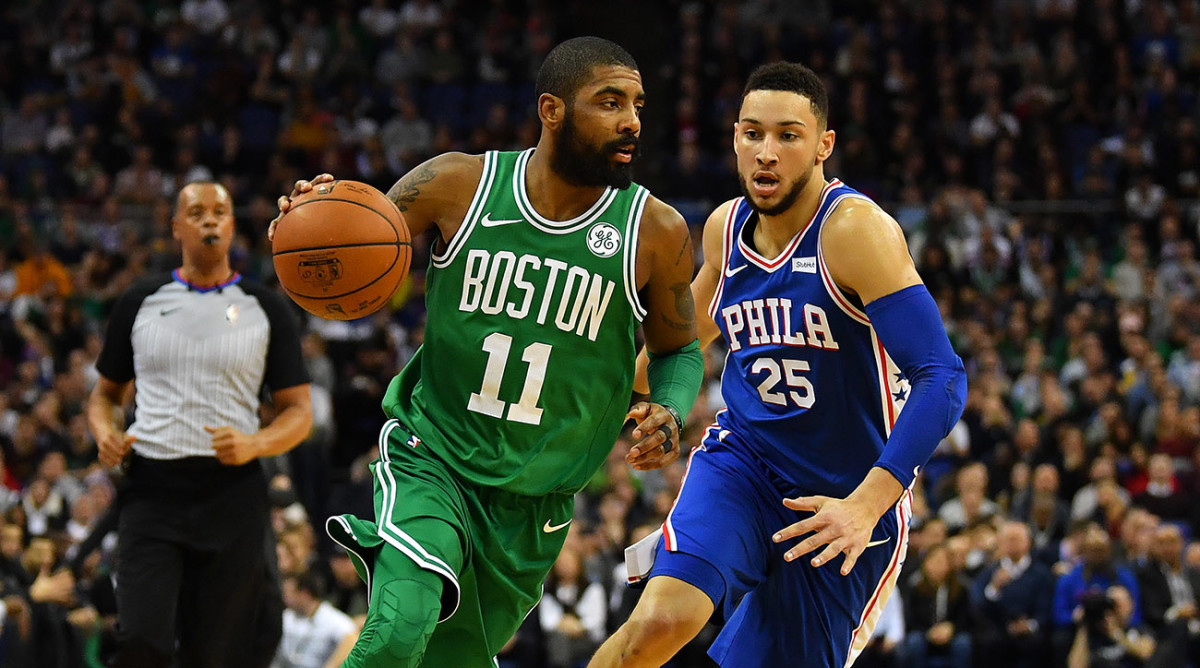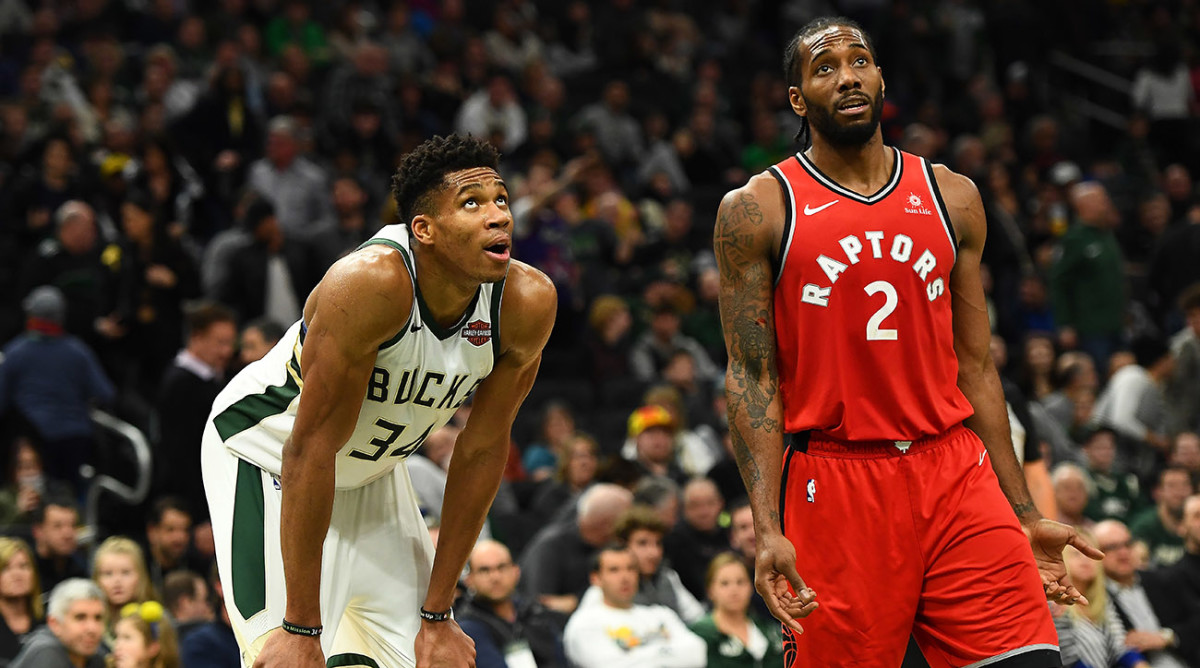2019 NBA All-Stars: LeBron James, Giannis Antetokounmpo Headline SI's Starters

All-Star Weekend—the NBA’s roaring midseason party with an exhibition attached—is only a month away, which raises the question of which stars should actually be invited to participate. As was the case last season, voting on the matter is split among three bodies: fans account for 50% of the final, weighted vote, a poll of active players accounts for 25%, and a media panel contributes the remaining 25%. First comes the matter of selecting the starters, which are split between conferences, and two broad positional groups: backcourt players and frontcourt players.
Every voter, media or otherwise, gets to fill out their ballot on whatever grounds they see fit. Some spring for the highest-wattage personalities or the most electric performers. Seeing as All-Star selections play into player contract bonuses and inform the shaping of a player’s legacy as it relates to things like the Hall of Fame, I find it makes most sense to reward the best players (who fit the relevant positional criteria) having the best seasons. Here are my intended selections* to start in the 2019 All-Star Game:
*Seeing as voting is open until Monday, Jan. 21, I’ll leave open the possibility for some of these votes to change under extreme circumstances. Excepting those, this is how I intend to vote.

WESTERN CONFERENCE
Backcourt: James Harden (Rockets) and Stephen Curry (Warriors)
An open-and-shut case. These are two former MVPs in the primes of their careers, improving upon their award-winning seasons. The West may be lousy with talented guards, but none are really in the class of Harden or Curry, so let’s not belabor the point.
Frontcourt: LeBron James (Lakers), Anthony Davis (Pelicans) and Paul George (Thunder)
Here we have an impossible choice, seeing as there is no way to fill out a ballot but to leave out two West frontcourt players with every right to start. You could omit James, who has dragged a misshapen Lakers roster to relevance despite itself; a devastating scorer in Kevin Durant, who has steadied a tumultuous Warriors season with every bucket; the incredible, inimitable Davis; the best-passing center in NBA history in Nikola Jokic; or George, a superstar wing who doubles as the anchor of the league’s best defense. That each has been awesome is a welcome inconvenience—especially considering that all five will eventually be All-Stars regardless. The choice of who starts in the game is, if anything, a footnote.
Yet out of respect for the exercise—and the official ballot—we still have to parse, consider, and choose … even if we double back and reconsider. After a few rounds of second guessing, I settled on James, Davis, and George. The case for LeBron begins with stature: he is the best, most uniquely dominant force in the sport. Given a suboptimal, poorly conceived roster, James has returned his usual box score excellence and a playoff-viable operation. Remove him from the picture—like with, say, a groin strain—and the Lakers not only lose, but risk implosion. This is what LeBron signed up for. Yet in understanding his performance, one has to account for the fact that James is still hitting all his usual statistical benchmarks (including 60% true shooting) while living in cluttered lanes and working as a part-time camp counselor for the Lakers’ youth contingent. It would be nice if LeBron deigned to play a little more defense in the regular season, though frankly, the rest is likely enough. There is no steadier hand when it comes to meeting the moment-to-moment needs of an offense’s execution.

By the time media votes are officially cast, LeBron will likely have played in 34 of a possible 47 games, meaning that he’ll have missed more than a quarter of the Lakers’ season. This could understandably sway some voters. I just can’t quite get there; it’s a close call between James, Jokic, and Durant, but when in doubt, the tie goes to the guy who runs the damn league.
Davis has it all, save that the Pelicans have a bad habit of losing more games than they win. We can only really hold Davis accountable for what happens in the minutes he’s actually on the floor, and in those minutes—especially those in which he has anything more than the absolute bare minimum of help—New Orleans tends to do just fine. So we turn instead to the realities of his production. Davis is third in the league in scoring (at 59.8% true shooting), third in rebounding, second in blocks, and eighth in steals on a per-game basis. After years of working as the endpoint of the offense, Davis has more than doubled his career assists average, stretching his import in just about the only way left. His defense, thus far worthy of a first team All-Defense selection, carries water for the undersize, the ill-equipped, and the inattentive. It is not an exaggeration to say that Davis means damn near everything for the Pelicans.
MANNIX: Kyrie Calls on an Unlikely Source: LeBron
George’s case is among the most complex, though it shares an appeal familiar to Davis. There is an enormous value to an offensive star who defends at a truly elite level. It’s one thing for a player to avoid liability, and another entirely to be so stifling and so persistent as to give a team its shape. George has crossed that threshold. The Thunder boast the best defense in the league precisely because of the way George blankets scorers and pursues the ball. None this season have been better at wreaking havoc. Deflections and preemptions make George a sort of logistical nightmare; an offense can run whatever clever little set it likes, but rarely will its many moving parts run on time so long as George is around, gumming up the works.
There are 12 minutes in every game where the Thunder have to search for answers. In the other 36, George assures high defensive standards, dynamic scoring, and secondary playmaking—which, when coming from a single player, make every lineup more malleable. It’s not just George’s scoring or his defense that earn him this spot. It’s the intersection of the two and what that provides.
Look, there isn’t a specific case against Jokic. There’s no fundamental reason why Durant has to be left out. Choosing between stars at this level simply requires splitting the atoms of excellence, and finding some preference in molecular scrutiny. All five of these candidates are having extraordinary seasons, even if we only have three votes to convey it.

EASTERN CONFERENCE
Backcourt: Kyrie Irving (Celtics) and Ben Simmons (Sixers)
No matter what weirdness hovers around the Celtics these days, Irving is an easy pick for the East’s top guard. It should go without saying that Irving is one of the most complete perimeter scorers in the game, so flush with moves as to make the most of any situation. Pick-and-roll from the top, hand-off in the corner, curl from the baseline, iso from the elbow—Irving can create from virtually anywhere, giving Boston a first-rate bailout option when a shot doesn’t materialize as intended. Considering the difficulty of Irving’s shots (and how few of them are assisted), 59.2% true shooting is a marvel. This may not be the highest-scoring season of Irving’s career, but his play is as mature and as refined as it’s ever been.
Nowhere is that more apparent than on defense. Irving had shown in critical playoff series that he could defend. The trick was getting him to bother on any consistent basis throughout the year. Irving has finally obliged, as is evidenced by the way he chases opponents around screens and sizes up driving opponents to draw charges. His efforts may not always be perfectly productive, but simply giving a s--- tends to go a long way for Irving.
Midseason NBA Awards: Will James Harden Win a Second MVP?
The other backcourt spot could go one of four ways. Bradley Beal is hard to deny, considering his brilliance from the heart of a team in perpetual disarray. The scoring (just 13.9 PPG) may not be there for Kyle Lowry this season, but the impact certainly is, conveyed in heady passes, threat projection, and constant activity. And it would be hard to ask more of Kemba Walker, considering his circumstances in Charlotte, than what he contributes on a nightly basis.
Even then, I find myself favoring Simmons. The conversation around Simmons this season has been maddening. Some matchups (like Boston) are especially difficult for him, as is the case with most young players. Dwelling on them misses what Simmons does in the aggregate, which is to change the complexion of any game he plays in. The very presence of a 6'10" point guard is a matchup wrecking ball. Bigs and wings are forced from their usual responsibilities to check Simmons, seeing as so few traditional point guards can manage it. When Joel Embiid starts to work over opponents inside, the help tends to come off Simmons—a fair choice considering that Simmons all but refuses to shoot jumpers, but one that forces a defense to adjust to different timing and angles than usual. Opting to defend Simmons with a bigger, stronger wing can work, but how many teams have one to counter Simmons and another for Butler?
These are the kinds of quandaries Simmons presents even before tip-off. No matter how good your defense, Simmons will orient it in some way to him, taking you out of your most comfortable alignment. And for all the hand-wringing about how Simmons, Embiid, and Butler work together (some of which is fair, some not), Philadelphia’s starters remain one of the best high-usage lineups in the entire league. It hurts the Sixers that Simmons is a conscientious objector to the very idea of a jump shot, but a giant playmaker who revs up his team in transition and works every angle simply hurts opponents more. Simmons is maybe the most versatile “point guard” defender in the league. Every opponent plays him for the drive, and still he shoots 58.3% from the field and gets to the free throw line even more often than he did last year. Passing over that kind of player—that kind of force—would seem to be overthinking it.

Frontcourt: Giannis Antetokounmpo (Bucks), Kawhi Leonard (Raptors) and Joel Embiid (Sixers)
With all due respect to Blake Griffin, there are no real alternatives here. These are three of the best players in basketball, each uniquely dominant for one of the best teams in the conference. Giannis is the most terrifying downhill player in the league, and the primary reason for Milwaukee having the best record in the NBA. Leonard is imposing in exactly the way Toronto needs, whether he’s digging into the opposing team’s top scorer or shrugging off defenders en route to the rim. Embiid is just absurd—skilled beyond explanation, enormous beyond address. Considering that all three will assuredly be All-NBA selections at season’s end, why wouldn’t they be definitive choices for one positional subset of the weaker of the two conferences?
